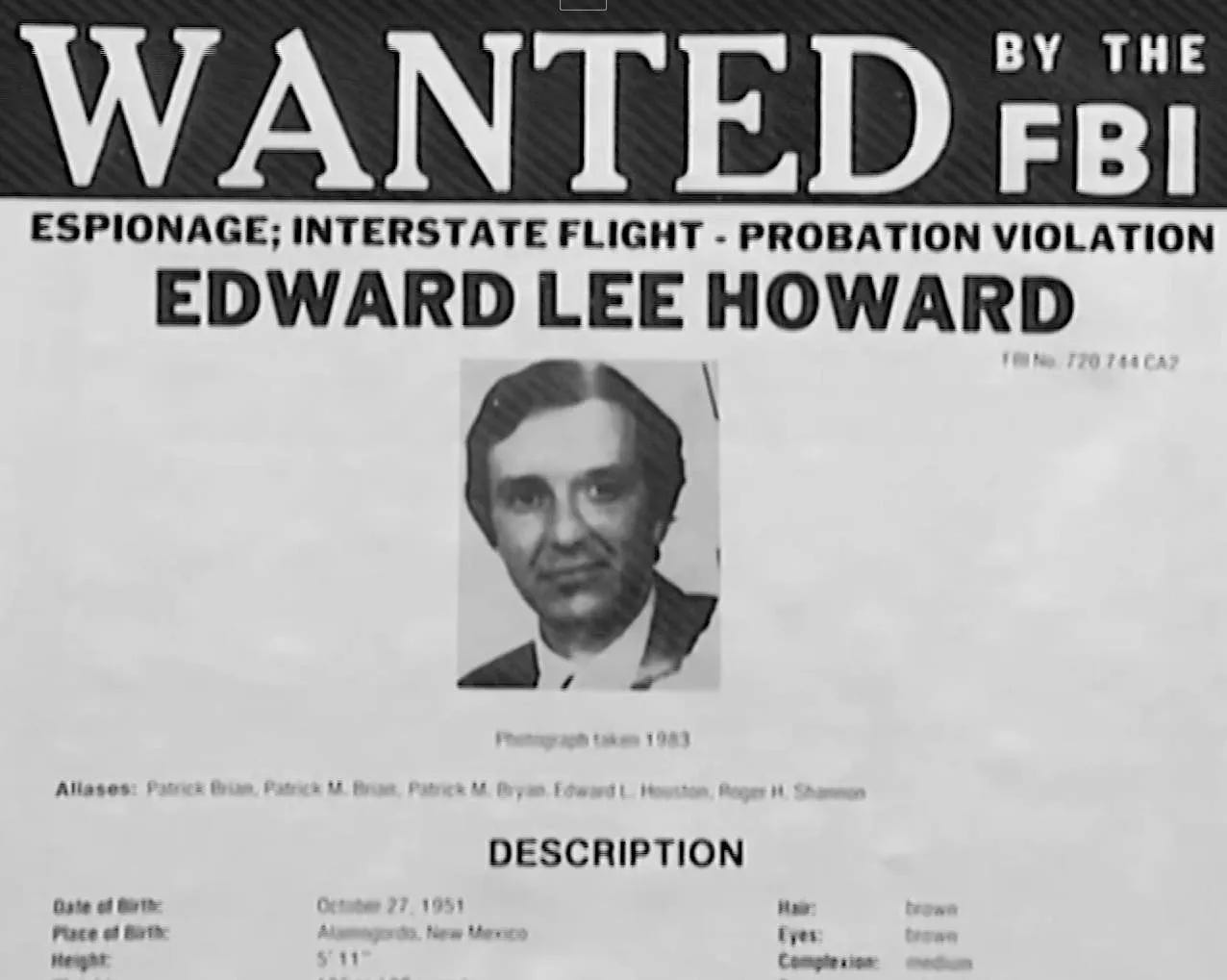This one’s a little different from my usual fare, but I figured it has been on my brain, and it involves analysis and a crime so it fits well enough. The news from yesterday of plans to dump new, young officers with no clear explanation why makes the Howard case all the more relevant and urgent. Back with a more traditional discussion of crime data in 10 days.
It was July 2002 when a 50 year old man mysteriously slipped and fell at his dacha outside Moscow. The man broke his neck and died in the accident, at least that’s the official story.
The man was named Edward Lee Howard and he was a former CIA officer who had defected from the United States in 1984.
I’ve been thinking a lot about Howard these last few weeks. As a former CIA officer, it's hard not to see the immense risks for United States national security that stem from unceremoniously dumping large swaths of the Federal workforce.
Howard was hired by the CIA in 1981 and was selected to serve as a case officer in Moscow. This included intense training in spotting and defeating the best surveillance in the world (David Wise’s The Spy Who Got Away is a great read on the whole case) as well as indoctrination into the incredibly sensitive assets that a Moscow case officer would be expected to handle.
Howard had a drinking and drug problem which had not been fully identified in the CIA’s initial vetting, but a routine polygraph prior to departing for his tour in Moscow picked up the alcohol and drug use as well as incidents of petty theft. Even more concerning to the CIA was that Howard’s acknowledgement of the theft still came with signs of deception.
The CIA decided against sending him to Moscow at the last moment and then unceremoniously fired him. Howard was shocked and furious at the CIA. Wise quotes a former CIA officer describing Howard’s anger, saying “Howard is angry and upset because he believes he did nothing wrong. The polygraph results are never explained to you, so no one is telling him what’s going on, no one in SE (Soviet Eurasia division) will see him. He is frozen out. No one is telling him why.”
Howard had a baby and moved to New Mexico, but his anger festered and he eventually decided to defect to Moscow.
The story of Howard’s defection is a really good one and it involves lots of mistakes by the CIA and the FBI, use of a dummy (known as a jack-in-the-box) by Howard and his wife to escape FBI surveillance, and his eventual resurfacing in Moscow. It also involves a pit stop at the Hotel Monteleone in New Orleans for a week of debauchery and drunkenly confessing thoughts about a desire to sell classified information to a former CIA colleague. The whole story is too much to recount here and not particularly germane to this piece’s main idea, but worth a read if you’re interested.
The CIA made numerous errors in this case, all of which were compounded by the decision to cut him loose with neither assistance nor an understanding of why he had been let go. Howard’s spiral into depression and anger did not include much CIA help to handle his issues which festered and eventually became legal problems. At some point, Howard admitted to CIA officers visiting him in New Mexico that he had thought about approaching the Soviet Embassy (he may already have done so). The CIA’s weak response was to offer to pay for psychological help.
Howard eventually met with the Soviets, was identified as a spy by a Soviet defector (who later re-defected), and fled the US. His treachery caused immense loss of access to sensitive collection programs within Russia.
It also cost lives.
Adolf Tolkachev was a Soviet engineer who is called the Billion Dollar Spy (read David Hoffman’s brilliant book for more on this case) because the information he provided the Air Force on the future of Soviet aeronautics saved over a billion dollars of future research and development costs. Tolkachev’s information was also invaluable when US forces had to go against a Soviet-supplied military in Iraq less than a decade later.
Howard had been read into the Tolkachev case he was expected to handle and undoubtedly gave him up to the Soviets (Tolkachev was also betrayed later by Aldrich Ames). Tolkachev was arrested and executed by the Soviets.
All because of the selfish decision making of a jilted former employee.
This post isn’t my normal cup of tea, but I felt compelled to write it as an espionage history enthusiast and former intelligence officer who sees vast dangers in the developing historical parallels.
Over 1 million people in the United States have a security clearance according to the most recent available estimates. Only a small minority have access to the depths of human intelligence like Howard had, but many of them know secrets that our adversaries would love to have.
Aldrich Ames walked out of Langley with 6 to 8 pounds of CIA cable traffic and single-handedly shut down the CIA’s Moscow operations for years. Oleg Penkovsky spent a few days in London with a joint CIA/MI6 team and gave US intelligence enough information about Khrushchev to come out ahead in the Cuban Missile Crisis. The vast majority of fired people — even those with top secret clearance — will not commit espionage, but it just takes one extreme case to cause damage and cost lives.
History shows that unceremoniously firing a potentially disgruntled employee can cause problems. It may not be today, but those problems can creep up unpredictably sometime in the future.
Doing it en masse with no plan to provide support to fired officers, therefore, is a particularly unwise approach. As Edward Lee Howard explained to David Wise, “They certainly fucked themselves,” and while history doesn’t necessarily repeat itself, it often rhymes.






!!! I had to do a double take when I got this email. I just finished reading The Billion Dollar Spy 30 minutes ago. The name Edward Lee Howard meant nothing to me until late yesterday evening. If this was from the algorithm and not a newsletter I’d swear it was surveillance capitalism at work lol.
I had the same thought, but what choice is there? Leave your enemies in power? Trump tried that the first time.
Of course Machiavelli would have recommended destroying them so thoroughly that they would never be able to retaliate, but that seems outside of the Trump administration's ability. Removing them from positions of power and cutting off their slush funds seems like the best option they have.